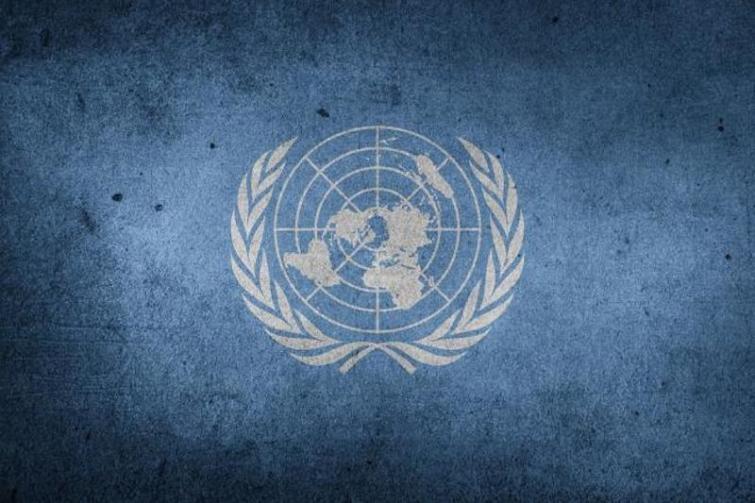
UN chief reaffirms commitment to untying ‘Gordian knot’ of Middle East conflict and instability
New York City, Apr 7 (IBNS): Underlining the “enormous” opportunities for sustainable development and investment in the Middle East, UN Secretary-General António Guterres has reaffirmed the Organization’s deep engagement in a “surge of diplomacy for peace,” to “untie the Gordian knot of conflict and instability".
The UN chief’s comments were made on Saturday, during the World Economic Forum (WEF) meeting on the Middle East and North Africa, held by the Dead Sea in Jordan on April 05 and 06. As an example of the regional conflicts that, he said, must be resolved, Mr. Guterres cited the implementation of a two-state solution for Israel and Palestine, “living side by side in peace with secure and recognized borders, and with Jerusalem as capital of the two countries”.
The Secretary-General, who has been visiting several Middle Eastern states, said that he was able to report positive progress in certain cases, such as the first free municipal elections in Tunisia, where “the democratic transition continues to advance”; his talks with the Grand Imam of Al-Alzhar Mosque in Egypt, with whom he discussed ways to advance tolerance and mutual respect; and the development of UN plans to combat hate speech, and safeguard religious sites worldwide.
A region of opportunities
Thanking King Abdullah II and Queen Rania Al Abdullah for hosting the meeting and championing peace, Mr. Guterres described Jordan as a “fundamental pillar of regional stability,” and a country with large private-sector opportunities.
With its large youth population, said the UN chief, Jordan – a “driving force” behind a landmark Security Council resolution highlighting the importance of including the voices of young people – is poised to “reap a demographic dividend.”
The Middle East and North Africa, he added, should not only be looked at as an area of conflict, but also a region of opportunities which, given the right internal approaches, and support from the international community, could unleash “remarkable dynamism and capacity”.
Multilateralism works. I am deeply convinced that there is no other way to deal with global challenges than with smart, evidence-based global responses, organized in a multilateral way to benefit all. My remarks to the @WEF: https://t.co/gF4bsDBTnE #MENA19 pic.twitter.com/CFDy8lXZFv
— António Guterres (@antonioguterres) April 6, 2019
Mr. Guterres noted that several countries in the region have integrated political demands made by their citizens, such as social protection, good governance and human rights; efforts have been made to tackle violent extremism; and steps against gender-based discrimination, including domestic violence legislation and penalties for sexual harassment, have been implemented.
On this score, Mr. Guterres emphasised the economic importance of empowering women: it has been shown that full and real gender parity would have a major impact on the region, increasing the gross domestic product by some $2.7 trillion by 2025.
Schools for Palestinian refugees ‘cannot be closed’
Following his appearance at the WEF meeting, the UN chief travelled to the Baqa’a camp, one of six "emergency" camps set up in 1968 to accommodate Palestine refugees and displaced people who left the West Bank and Gaza Strip as a result of the 1967 Arab-Israeli war.
Today, Baqa’a is home to nearly 120,000 registered Palestinian refugees, and is the largest camp north of the Jordanian capital, Amman.
There, he met with staff and beneficiaries of the United Nations Relief and Works Agency for Palestine refugees in the Near East (UNRWA), and emphasized the importance of continuing to fund the vital services UNRWA provides to millions of Palestine refugees in the West Bank, including East Jerusalem, Gaza, Jordan, Lebanon and Syria.
“The stories I heard today were very compelling, both in showing the strength and courage of Palestinian refugees, and in conveying their concern about their future,” said the Secretary-General. “What remains with me are words of hope and determination of men and women, young and old.”
I was so moved to see students in an @UNRWA school in Jordan learning about democracy, human rights & tolerance, preparing them to be exemplary citizens. These schools cannot be closed! I appeal to the international community to continue their support to UNRWA. pic.twitter.com/7DBjpFRukE
— António Guterres (@antonioguterres) April 6, 2019
Mr. Guterres also visited one of the UNRWA-run schools in the camp and, in remarks to the press made following the visit, he insisted that such schools must not close: "in 700 schools, 530,000 Palestine refugee children are learning about human rights, about democracy, about tolerance, making the conditions to be exemplary citizens. And this is something that warms my heart."
These, and other UNRWA programmes, he said, represent a very important contribution to the well-being of the Palestine refugee population, to seeing their human rights respected and dignity upheld, and are an important factor of stability.
The UN chief noted the extremely difficult financial problems that UNRWA has faced, and the devastating impact that the closure of UNRWA health and education programmes would have in a country like Jordan. He appealed to the international community to maintain the level of financing for UNRWA in 2019, and make sure that stability is guaranteed for the following year.
(Reporting by Asha Bajaj)
Support Our Journalism
We cannot do without you.. your contribution supports unbiased journalism
IBNS is not driven by any ism- not wokeism, not racism, not skewed secularism, not hyper right-wing or left liberal ideals, nor by any hardline religious beliefs or hyper nationalism. We want to serve you good old objective news, as they are. We do not judge or preach. We let people decide for themselves. We only try to present factual and well-sourced news.







